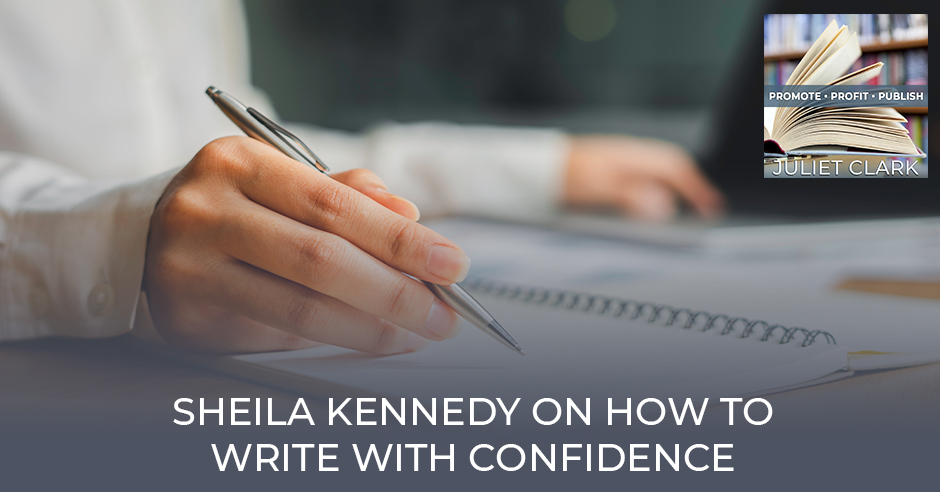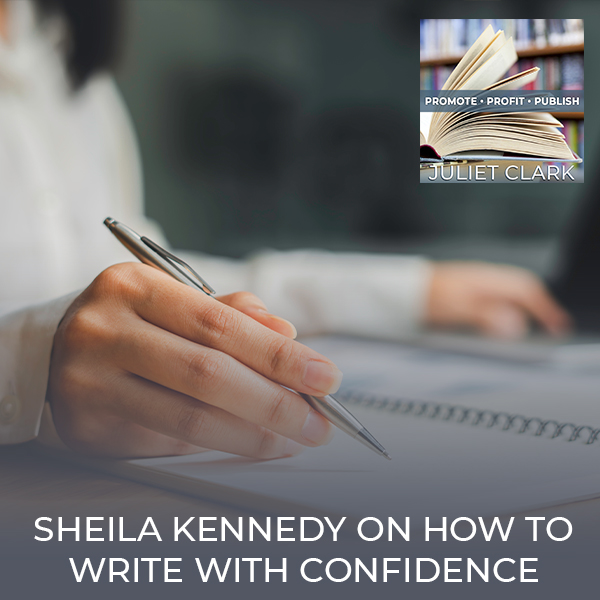
Writing can be a nerve-wracking experience. The writer’s vulnerabilities are often exposed, especially when they’re writing about personal stories. Confidence coach, author, and publisher Sheila Kennedy sits down with Juliet Clark to talk all about confidence. Sheila shares tips on working past your vulnerabilities, finding the right angle for your story, and bringing your own gifts to the table. Sheila and Juliet also talk about the language of publishing. Discover the secrets of confident writing today.
—
Watch the episode here
Listen to the podcast here
Sheila Kennedy On How To Write With Confidence
Authors, you’re going to love our guest. Before we go over to her, I want to remind you to go over and take our Promote Profit Publish Quiz. Go to www.PromoteProfitPublishQuiz.com. Find out if you’re ready to promote. You may have written that book or in the process, but if you’re not building an audience, who’s going to read it? You may have a lot of other things to do in the interim. Don’t be one of those people who gets it written and then looks for your audience. You don’t know if it’s the right audience. Go over and take the quiz. Don’t forget to go over to YouTube and subscribe to us, Superbrand Publishing.
If you’re reading the blog, you can see all these people are live over on YouTube. Find out if you’ve seen them before. You’ll recognize them next time you see them talking. Our guest is Sheila Kennedy. She believes that everybody has a story to tell. Sheila Kennedy supports others as they write their wisdom, speak their stories and impact the world. An author, publisher and marketing and publicity strategy, she opens the doors of opportunities for authors, speakers and entrepreneurs to be seen, heard and hired. Welcome. How are you?

Writing With Confidence: Our job as authors, no matter what we’re writing, is to move our readers.
I am wonderful. Thank you. How are you? Thanks for having me.
I’m glad to have you. Let’s talk about you’re not only a writing coach but a confidence coach as well.
That’s how I started. I find that I do more confidence coaching than anything else. When people are ready to write stories about their life especially, it is an incredibly vulnerable process that most people aren’t prepared for. They say they want to, they’re excited or maybe they’ve written, and it’s time to hit go onto publishing, and there’s something that gets in their way all the time, whether that’s imposter syndrome, fear of success or fear of failure, whatever it is, they don’t want to be critiqued. They don’t want people to think the wrong thing about them. They get lost in that sometimes. Instead of letting them slide further down the rabbit hole, I hold them up.
I’ve noticed about the last three people that we’ve published books for fall apart in that. While the book is being set up, that period where there’s formatting, cover design and we’re putting together the bestseller campaign. I can notice it when it starts to look overwhelmed, which is me getting in my own way. There’s a lot of imposter syndrome, a lot of fear, which I do remember from my own book. I was scared that people would judge me. Some people did. They wrote awful reviews that were hurtful. In the end, I remember saying to myself, “How many books have you written?”
It’s the whole Brené Brown quote, “I don’t even want to hear from people who aren’t in the arena. Unless you’re willing to do this, your opinion doesn’t matter to me.” It’s hurtful as it can be sometimes.
Here’s what I see when you talk about that vulnerability. I find that there are two groups, and you must bring them in the middle somehow. There’s that group that getting emotion and vulnerability out of them is like pulling teeth. There’s that other end of the spectrum where the whole book is TMI and details about their story. How do you balance those two types of people?
One of the things that people mistake is a memoir is a story of somebody’s life. It can be a minute, 50 years, 30 years, or a month. Share on XI always have them ask one question. As they’re writing, as they’re reading it afterward, and as I edit, “Does this information enhance the reader experience or take away from it? If it’s a detail that enhances their experience because they need to know it, then it’s fine to leave in and be descriptive. If it is distracting where it takes away from the purpose of the book or what you want the outcome to be for them, then you take it out.” That’s what I use as my guidepost all the time.
You also read a lot of memoirs. Is a memoir a big TMI? I don’t read many memoirs. How do you figure out when someone’s telling their life story? You probably have applied the same question. What is important and what isn’t important? How do you get to the heart? Are these memoirs for the family or for mass consumption?
Most of the time, it’s for mass consumption, but one of the things that people mistake is a memoir is a story of somebody’s life. It can be a minute. It can be 50 years, 30 years, a month or just one event. It’s not an autobiography. You’re getting engaged in telling the story of some part of your life. You look at it through the same thing. Does this enhance the reader’s experience? I had somebody writing that, “I got in the car, turned the car on, drove for 5 miles. I stopped the car, pulled the keys out, sat there for a minute, opened the door, got out, walked up the stairs to the apartment.” I was like, “This doesn’t enhance the reader’s experience. We all have gotten in and out of cars. We know the process.”
If there was something that was very descriptive that we wouldn’t have otherwise known but needed to understand, then by all means, we put that in because it enhances the reader’s interaction with that. A lot of people are feeling like memoirs are not important and shouldn’t be written unless you were big, famous and everything else. I disagree with that. It might be a little bit harder to sell. That might not sell one million copies, but you will sell. There is an audience. You have to find the audience. It’s a matter of connecting with them.
I’ve only done two memoirs we’ve only published. The first one was Wait, How Many Husbands Have You Had? The second was supposedly a secret, but it turned out that everybody knew it.
I am honored by the memoirs that I’ve gotten to be a part of and help form. They’re incredibly touching usually. They’re funny. I wrote a memoir for a New York State Supreme Court Justice. He said, “I want to write a book about the funny things that happened while I was on the bench.” He was on a bench for 33 years. I said, “That’s fine. I’m going to come over.” We sat down and I’m interviewing him. I’m like, “You tell me all the funny stories.” We sat there for a few hours. He’s telling me all these stories and I’m writing them down. I go, “Is that it?”
He’s like, “Yes. That’s all I can remember.” I was like, “Is there going to be a lot more?” He’s like, “I don’t know. Why?” I said, “This isn’t enough for a book or a chapter of a book. Let’s tell the story of your time on the bench. We can infuse humor throughout. There’s a bigger story here. What’s that bigger story?” We ended up framing it like a trial. There was an article written about him in the local newspaper when he retired about how this judge showed humanity on the bench. I said, “Let’s put your life on trial as a judge. Let’s see if you indeed showed humanity on the bench.”
We had character witnesses, sidebar arguments, and we set it up exactly like a trial. There were opening arguments, closing arguments. The reader was the jury deciding whether or not the judge show humanity on the bench. It was great. We had one chapter that was all the funny stories. He was bald. The name of that chapter was I Lost My Hair but Not My Humor. It was great. Everybody has loved the book. Sometimes it feels like a tell-all. It feels like, “Who would care?” It’s finding the angle of the story you want to tell that will be appealing to an audience.
We have a book that we’re doing the promo work for a child psychiatrist who has given up child psychiatry. Now she’s more in adult psychiatry, but she’s telling stories. There is the truth about people get crazy with the full moon. It’s funny because when I read the first draft of the book, it’s these stories about crazy people. At the end of every chapter, she gives a synopsis about how you can help these people with a diagnosis. There’s help in there. Some of the stories are funny and some of them are like, “How does someone even get like that?” You realize that there are a lot of crazy people out there. The book is meant to help, but there are funny things. There are things where you would want to cry, and your stomach feels so bad for people. That’s amazing. I love the way you set that up. That was creative.

Writing With Confidence: A lot of people feel like memoirs are not important and shouldn’t be written unless you were big and famous; that is not true.
Thank you, I appreciate that. We have to remember that our job as authors, no matter what we’re writing, is to move our readers. Emotionally touch them, emotionally connect with them. Sometimes that’s going to be personal stories. Sometimes it’s going to be making up something, even in our educational information that we’re putting out. If it’s strictly like a business book or things like that, what we need to have is some emotional attachment or connection with the reader so that they can dive into this and feel like it’s made for them. I’m a big fan of memoir writing. If they have something to say, they should say it. They shouldn’t have to wait for anybody else to validate it. Nobody needs permission to say what they feel like they need to say or share what they want to share.
There’s a fine line between confidence and narcissism. Address that please.
When I was actively confidence coaching, I was THE confidence coach. THE was always capitalized because I wasn’t just any confidence coach. I was THE confidence coach. That’s like being cocky, not confident. I trusted the fact that there was nobody that was going to do it like me. Think about how many authors we have. Nobody is going to have the exact same experience. Without me or if they were with me, does that mean that it’s the right experience for everybody? No, but I will have people and an audience. I don’t feel like that’s arrogant or being cocky. That’s understanding who I am, what my strengths are, and there are people that I am meant to be connected to.
It’s part of our program. We teach basic marketing because coming from the advertising world, I feel like everybody gets into the digital hype, but they don’t understand the basics, buying triggers and things like that. Part of that buying trigger is identifying, “Is this person a significant person? Is this person a growth person? Are they neutral?” There are only 4 or 5 reasons why people buy. The point of that is also that you and I could have exactly the same program, but depending on our personalities, people are going to choose one of us over the other because we meet their needs. That is part of what you’re talking about between that cocky, the confidence and what looks like narcissism. The reason I said that is there’s all that marketing out there, “Look at my beautiful house, my beautiful car, my beautiful wife.” A lot of it is an illusion. People out there, no matter what kind of coach, they’re hiring authenticity, “How does this feel to me? Is this person real to me?”
The other part is that I also am very confident in telling you that I can be a hot mess. I had a lot more messiness in my life than I have orderliness. I’m not afraid to tell you about that because it is in that messiness that I’ve learned as much as I have. I don’t have a perfect life. I am far from it, but I’m willing to take you with me. That’s the whole reason I started this. I left confidence coaching, got into publishing, and writing books because I didn’t have a great experience. I didn’t want anybody else to have that experience. I know that’s why you started your own publishing company because we don’t want people to have that same negative experience that we did. That means that I’m going to work my butt off to make sure that you have a positive experience. I don’t feel like that’s cockiness at all.
This is my second business. I started my real estate business because I had a bad experience with an agent. I came out of advertising. I was like, “How difficult can this real estate thing be?” It wasn’t hard for me at all. It’s funny how both of our businesses did more from this because we saw right away from our experiences that there was a better way. Did your experience come from using another self-publisher?
It did.
Mine as well.
Lovely person, I enjoy them. It was an experience that did not meet my expectation at the time. I had a different expectation, then I created it because I didn’t know if it was out there. I remember when I started the company, there was a gentleman who was in publishing at the time. He said, “How do you think that you can even compete with any of these bigger names?” It’s some of the names that we had spoken about. I was like, “I don’t expect to compete with them. I bring my own gifts to the table. I am going to create my own experience.” There are more businesses for us than any one of us could handle ever. I will do what I can do. I will put out what I can put out, and the right people will come. I’ve never had to do marketing. I’m very blessed because people that know and trust me, send me referrals. I have not been to one of my clients because they know that I’m going to do everything I can to make sure they have a good experience.
It’s the same here. That was coming from traditional publishing. I thought I had an expectation of what my experience with a self-publisher would be like. I have to tell you, I was appalled like, “You’re charging for what? That doesn’t do anything.” One of the big ones was the list. “$2,000 and we’ll send your book out to our list of one million people.” “I’m smart enough to know that your list of one million people are not looking for my mystery novel. They are people who want to publish a book. I’m paying for you to brag.”
Put out what you can put out, and the right people will come. Share on XIt was things like that. We speak this language of publishing. We can look at a contract and say, “That’s not something you need,” versus if an engineer comes in and writes a book, they don’t understand the language. The important part is when people get these contracts, they don’t understand what they’re getting. There’s a huge disappointment in all that. The smaller people like us who provide a real quality hand-holding experience are the publishers that people need to be with to not be disappointed in what’s happening.
They maintain so much more control in all of those things. We won’t get into how much money it saves people in the long run. Publishing with The Big Five, if you look at the amount of earning power that you lose over the course of time, you may not have to put up any money for services upfront, but you are paying for that. I’m not begrudging traditional publishing companies. Everybody needs to make their own money and do it in their own way. There’s this belief that it’s magic, that everybody magically makes money. It’s not the way it happens. You do pay for it. You don’t pay for it upfront. It costs you a lot more in the long run.
When you have a business book, it’s better to self-publish that because then you have control over all the marketing. You can integrate it into your business in whatever way you want. For most of our clients, we consider that business book a loss leader that gets to know your product. Our expectation going in is, “Don’t expect to make your money here. The expectation should be that you’re going to make your money over here with that program.” For most people, if they sell one coaching program from their book, they’ve covered the cost of publishing that book. It all works out in the end. Sheila, where can we find you if we want to talk to you more? What have you got for us?
If you want to connect with me, you can go to TheZebraInk.com. I have all kinds of goodies over there. I have things like The Daily Magnet, which is an abundance magnet for practices that confident entrepreneurs shared with me that I then, in turn, put into practice for 60 days. In 60 days, I tripled my income. I attracted my ideal clients. I wrote all about that in one of my books, Choices to Changes. If you want to create that writing habit but you’re not sure how, I’ve got some Writing Prompts 21 days. I will love it if you join me. I have a book club. We have authors that have written the books. They get to spend time with the readers on the last Thursday of every month. That’s there too, that’s free. I would love for you to become a member of the book club.
If you’re not using writing prompts, you need to be. That’s what got me started as well, to loosen up with the silliness of what you can write from something. I haven’t looked at yours, but I know I used some silly ones. It’s lightened the whole thing up.
It’s a century experience. I’ll throw out one. It would be, write for five minutes. Set your timer for five minutes. What you see, write this minute. Whatever is in your viewpoint is what you’re seeing, you write and describe. It helps people get into the habit of writing but also, the description and putting down on paper what their experiences right then so that the reader can walk into that moment.
Thank you so much for being on here.
Thank you for having me, Juliet. It’s been fun.
Important Links
- www.PromoteProfitPublishQuiz.com
- Superbrand Publishing
- TheZebraInk.com
- The Daily Magnet
- Choices to Changes
- Writing Prompts 21 days
About Sheila Kennedy
 Believing everyone has a story to tell, Sheila Kennedy supports others as they write their wisdom, speak their stories and impact the world. An author, publisher, and marketing and publicity strategist, Sheila opens the doors of opportunity for authors, speakers and entrepreneurs to be seen, heard and hired.
Believing everyone has a story to tell, Sheila Kennedy supports others as they write their wisdom, speak their stories and impact the world. An author, publisher, and marketing and publicity strategist, Sheila opens the doors of opportunity for authors, speakers and entrepreneurs to be seen, heard and hired.
Love the show? Subscribe, rate, review, and share!









Leave A Comment